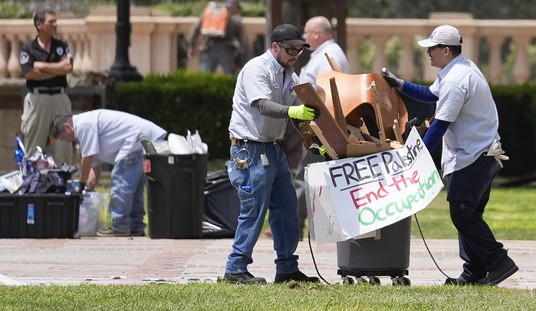In the 1960s, the left-wing radicalism of college students drove massive changes in American politics. The primary issue was the war in Vietnam, but there was more bubbling and churning beneath the surface than just anti-war sentiment. Racial issues had been forced fully into the open. The women's liberation movement was set to explode. Class divisions were heightened as inflation took hold and unemployment began to rise.
At the same time that students were protesting in America, they were also marching in France, Germany, Great Britain, and most of Western Europe. The status quo was out. Progressivism (liberalism) was in.
This was the beginning of the progressive era in America and the world. The Wall Street Journal pegs the beginning of the "progressive era" as a phenomenon that began this century. In fact, even when the right had control of governments in the U.S. and Europe during the 1980s and early '90s, the left wielded enormous influence on society and culture.
It's been a left-wing world since then.
But the ground is shifting beneath our feet, and reform and revolution are in the air. What pundits and analysts tried to pass off as "backlash," "nativism," and "neo-fascism" was actually the mass movement of minds in revolt against a status quo that didn't care about ordinary people, didn't care that the country of their birth was being systematically and deliberately eliminated for some higher purpose.
In Europe and America, the pandemic interrupted the movement opposing the left. It was short-circuited as fear (much of it unfounded, as it turned out) was used to maintain control and squelch the nascent populist movements. Economic shutdowns, forced school closures, and mandates for vaccines that didn't prevent disease, which resulted in tens of thousands of workers losing their jobs for refusing the jab, put a cork in the bottle, at least for a while.
The scales have now fallen from the people's eyes, and the left is being soundly thrashed at the polls across the industrialized world.
Across Europe, where economic growth has largely stalled, conservatives and populist right-wing parties are making unprecedented gains. Three-quarters of governments in the European Union are either led by a right-of-center party or are ruled by a coalition that includes at least one.
The shift is set to continue. Canada appears poised to kick out a deeply unpopular progressive prime minister and Germany is expected to dump its center-left government. Polls show the top two parties in Germany represent the center-right and the far-right.
Part of the shift is the normal pendulum of politics swinging back and forth between established parties on the left and right. The difference this time is a strong strain of populism and a growing rejection of traditional parties.
The left-wing governments, which have largely ruled for 50 years, sought to implement their social agendas at the expense of ordinary people's sensitivities and livelihoods. They tried to use economic policies to effect massive social changes regarding equity, diversity, and inclusion in their societies.
They sought revolution instead of evolution. And they're finding out that the masses of ordinary people who work, pay, live, and die in their countries never wanted a revolution. They're discovering that changing societies to reflect their own image of "justice" needs a consensus.
And the left has lost that consensus.
“It’s a broad shift that goes across countries,” said Ruy Teixeira, a lifelong Democrat who's a fellow at the American Enterprise Institute. “Working-class people are just p****d off—about immigration, about all the culture war stuff, and the relatively poor economic performance that has shaped the working-class experience in the 21st century.”
In country after country, many working-class voters—especially those outside the biggest cities—are signaling the same thing: They mistrust the establishment—from academics to bankers to traditional politicians—and feel these elites are out of touch and don’t care about people like them.
Years of increased migration and trade, coupled with low economic growth, have led to a backlash and a rise in nationalism, where people want more of a sense of control, political analysts say. The rise of social media has exacerbated divisions and led to an upsurge in antiestablishment parties.
It's more than bad economies, untrammeled immigration, and a feeling by ordinary people that they've somehow lost control and are being manipulated and driven by uncaring elites.
It's a revolution of the human spirit, the unquenchable desire to be free, to be able to live, love, and thrive by one's own native intelligence and hard work.
This universal desire crosses national boundaries and infuses all races, creeds, religions, and genders on earth. It's not right or left. It's simply human. And that's something the left has never understood.










Join the conversation as a VIP Member